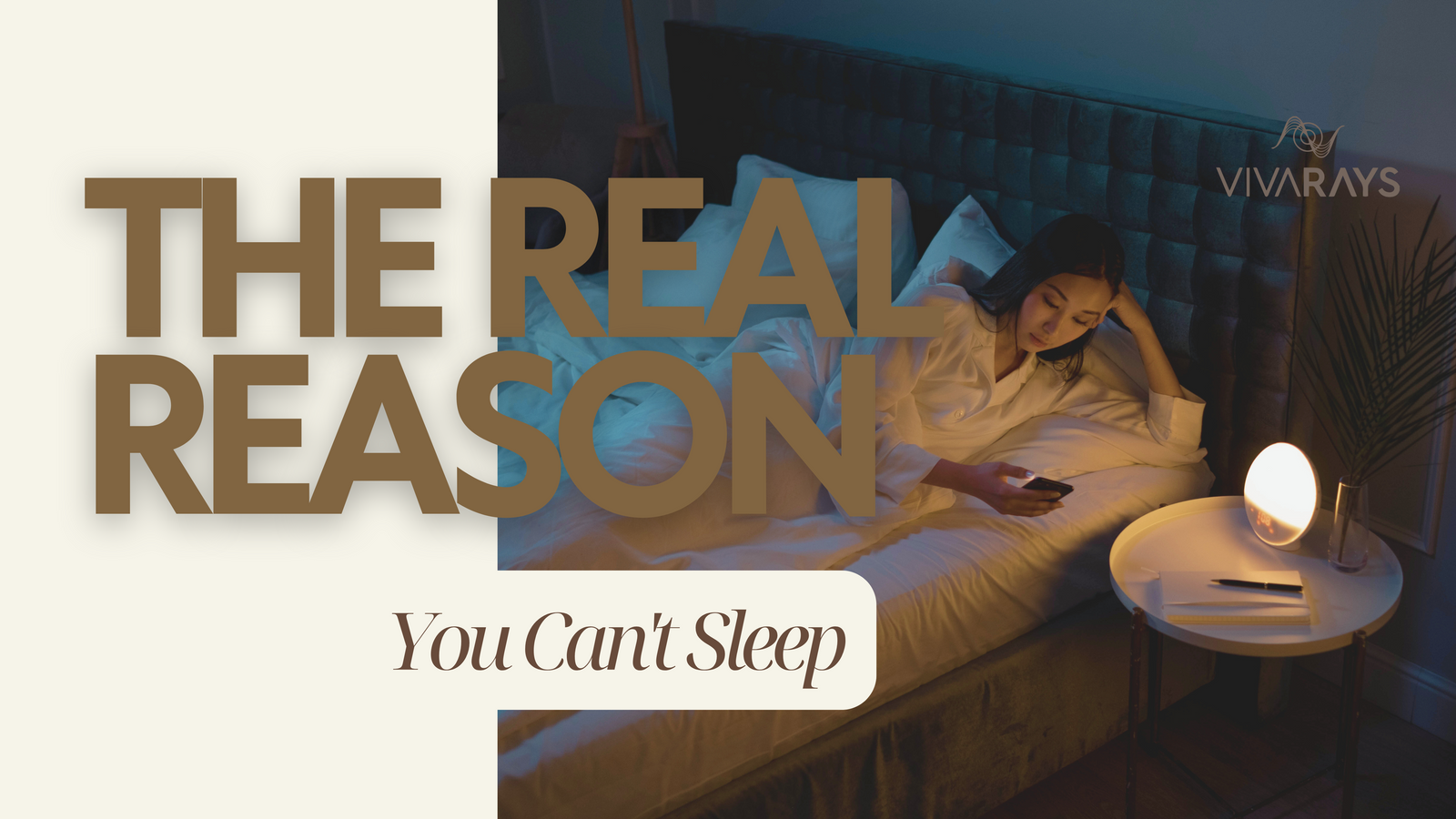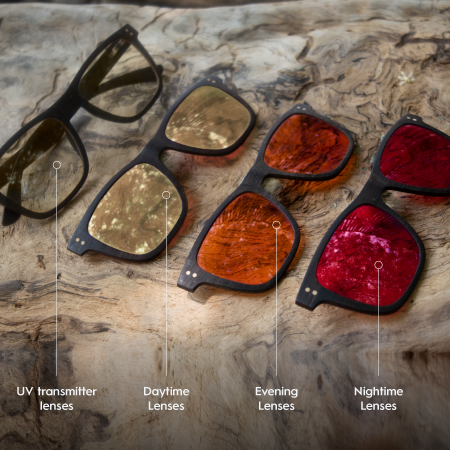The Real Reason You Can't Sleep (It's not what you think)

How a simple light habit could end your 3 AM wake-ups forever?
Let me ask you something...
Do you ever find yourself wide awake at 3 AM, staring at the ceiling while your mind races with tomorrow's to-do list?
Maybe you fall asleep fine, but then BAM – you're up in the middle of the night like someone flipped a switch in your brain.
If this sounds familiar, you're not alone.
Millions of people struggle with this exact same problem. And here's what's crazy... Most of them are trying to fix it completely wrong.
They're popping melatonin like candy. Trying meditation apps. Buying expensive mattresses. Even cutting out caffeine entirely.
But here's the thing – and this might surprise you...
Your sleep problem probably isn't a "sleep" problem at all.
It's a light problem.
The Missing Piece of the Sleep Puzzle
"I tried EVERYTHING. Strict diets. Supplements. Cold showers. Meditation. You name it.
Nothing worked.
I was a night owl for years, waking up every single night, mind racing, heart pounding slightly, that familiar wave of anxiety washing over me. I felt like I was losing my mind.
I'd lie there staring at the ceiling, wondering what was wrong with me. Why couldn't I just sleep like a normal person?
I spent thousands on sleep experts, bought every gadget, tried every hack.
Then I discovered something that changed everything...
The real culprit wasn't stress or hormones (though those played a role). It was my relationship with light.
You see, I'd been living completely backwards. Dim artificial light all day, then blasting myself with LED screens and overhead lights until bedtime.
I was essentially living in perpetual twilight during the day and artificial daylight at night.
No wonder my internal clock was completely screwed up."
You see, your body has an internal clock – your circadian rhythm – that's been fine-tuned over millions of years of evolution.
And this clock? It's not set by your Apple Watch or the time on your phone.
It's set by light.
As Dr. Satchin Panda, one of the world's leading circadian biology experts, puts it:
"The circadian clock is not set by the time on your watch – it's set by light."
Think about it...
Our ancestors spent their days under bright sunlight and their nights in near-complete darkness (maybe some firelight or moonlight).
But what do we do?
We go from bed to dimly lit homes, to cars, to offices with artificial lighting. Then we blast ourselves with LED screens and overhead lights until we finally crawl into bed.
We're living in perpetual twilight during the day and artificial daylight at night.
No wonder our internal clocks are completely screwed up.
What Should Be Happening at 3am (But Isn't)
Here's what your body is SUPPOSED to be doing at 3 AM:
-
Deep sleep mode activated: This should be your peak restoration time
-
Core temperature at its lowest: Your body naturally cools to maintain deep sleep (reaching its lowest between 2-4 AM)
-
Melatonin at peak levels: The sleep hormone should be flooding your system (peaking around 2-3 AM for most people)
-
Cortisol staying low: Your "wake up" hormone should be barely detectable until a few hours before natural wake-up
This is when your body does its most important work:
-
Growth hormone actively repairs tissues (largest pulses occur in early deep sleep cycles)
-
Your immune system gets fortified
-
Cellular regeneration kicks into high gear
-
Your brain consolidates memories and processes emotions
When everything's working right, you sleep like an angel through the night.
But when your light exposure is off, here's what happens instead:
Your brain gets confused about what time it is. Melatonin production gets suppressed or delayed. Your core temperature doesn't drop properly. And cortisol starts spiking at the wrong time – essentially creating a premature "dawn" signal internally.
The result? You're wide awake at 3 AM, feeling anxious and wired, because your internal clock thinks morning has come when it's still the middle of the night.
The Science Behind Your Sleepless Nights
This isn't just theory – the research is crystal clear.
Study #1: The Light That Kills Melatonin
One groundbreaking study in the Journal of Clinical Endocrinology & Metabolism found that ordinary room light before bedtime (just 100 lux – about as bright as a dim lamp) was enough to:
-
Significantly suppress melatonin release
-
Shorten melatonin duration by 90 minutes
-
In some people, wipe out melatonin production by 85-90%
And bright blue light? Even worse.
Just one hour of blue-enriched light in the evening can suppress melatonin by up to 90%.
That's like turning off your body's natural sleep switch.
Study #2: The Cardiovascular Sleep Sweet Spot
A massive 2021 study of 88,000 British adults revealed something shocking:
People who went to bed between 10:00-11:00 PM had the lowest rates of cardiovascular disease.
Those who went to bed after midnight? They had a 25% higher risk of heart disease.
The researchers believe this is because extreme bedtimes reflect circadian misalignment – your body clock getting completely out of sync.
Study #3: How Your Sleep Cycles Actually Work
Sleep isn't just "being unconscious." Your brain cycles through 4 distinct stages in roughly 90-minute cycles:
-
Stage 1 (N1): Brief dozing-off period
-
Stage 2 (N2): Light sleep where body temperature and heart rate drop
-
Stage 3 (N3): Deep sleep – critical for physical restoration
-
REM Sleep: Brain highly active, vivid dreaming, memory consolidation
Here's the kicker: The timing of these stages follows a precise pattern.
In the first half of the night, you get mostly deep sleep (20-40 minutes per cycle). This is when your body repairs tissues, releases growth hormone, and fortifies your immune system.
In the second half, REM sleep dominates (sometimes 30-60 minutes per cycle). This is when your brain processes memories and emotions.
If you go to bed too late, you miss the deep sleep window. If you wake at 3:00am, you miss the REM window.
Either way, you feel terrible.
Study #4: The Cellular Energy Connection
Scientists have discovered that red and near-infrared light (found in natural sunlight) literally charges your cellular batteries.
One experiment showed cells exposed to near-infrared light had a significant jump in ATP output within minutes – purely from light stimulation.
Meanwhile, blue light at night has the opposite effect, increasing cellular stress and reducing mitochondrial efficiency.
We're starving ourselves of the light we need and overdosing on the light that hurts us.
During the day, we need bright natural light (50,000+ lux from sunlight) but we're getting maybe 200-500 lux indoors.
At night, we need darkness, but we're blasting ourselves with LED screens and overhead lights.
We've got it completely backwards.
The Hidden Health Cost of Bad Light Habits
Here's where this gets serious...
Chronic circadian disruption isn't just about feeling tired. The research shows it's linked to:
Mental Health:
-
Mood disorders: Disrupted light cycles increase anxiety and depression risk
-
Cognitive impairment: Poor sleep architecture leaves you groggy and unfocused
-
"Social jetlag": Forcing yourself into a schedule at odds with your rhythm creates constant circadian strain
Metabolic Problems:
-
Weight gain and obesity: Studies show night shift workers have significantly higher rates of metabolic syndrome
-
Insulin resistance and diabetes: Irregular light cycles throw off blood sugar regulation
-
Digestive issues: Late-night eating disrupts circadian rhythms in metabolism
Cardiovascular Disease:
-
Hypertension: Misaligned clocks lead to elevated blood pressure
-
Heart disease risk: That 88,000-person study showed 25% higher cardiovascular disease risk for extreme bedtimes
-
Systemic inflammation: Circadian disruption triggers inflammatory pathways
Even Cancer: The World Health Organization has classified night shift work as a "probable carcinogen" due to circadian disruption. Night shift workers show higher rates of breast and colorectal cancer.
The Immune System Connection: Chronic misalignment affects gene expression in ways that compromise immune function, making you more susceptible to illness.
Your 3 AM wake-ups aren't just annoying – they're a warning sign that your entire system is out of sync.
As one review in Translational Psychiatry put it: exposure to light at night or irregular schedules "can precipitate or exacerbate affective (mood) symptoms in susceptible individuals."
Translation: Your light habits are literally making you sick.
The 24-Hour Sleep Strategy That Actually Works
Forget everything you think you know about "sleep hygiene."
This isn't about what you do in the hour before bed. It's about how you interact with light for your entire day.
Here's the game-changing approach:
Morning: Light Yourself Up
Get outside within 30 minutes of waking up. No sunglasses. No windows. Direct sunlight hitting your eyes for at least 10-15 minutes (some experts recommend 15-30 minutes).
This does two crucial things:
-
Spikes your cortisol appropriately (the healthy morning surge that peaks 30-45 minutes after waking)
-
Sets a timer for melatonin release about 14-16 hours later
Even on cloudy days, natural outdoor light is still 10x brighter than indoor lighting.
The Research: Studies show people who get more bright light in the morning produce melatonin earlier at night and sleep better. Morning light exposure literally resets your circadian clock every day.
Midday: Take a Sun Break
Around solar noon (when the sun is highest, roughly 12-1 PM), step outside for 10-20 minutes. This isn't just for vitamin D – the red and infrared light literally charges your cellular batteries and prevents that afternoon crash.
The Science: A 2025 study found that exposing people to 830-860 nm light (near-infrared) on their torso improved their energy and even eyesight by energizing cells throughout the body.
Think of sunlight as a nutrient: getting some midday reinforces to your circadian clock that it's daytime, which strengthens the signal that nighttime is for sleep.
Evening: Enter Cave Mode
As the sun gets lower (late afternoon and sunset), try to get some natural light exposure. The color shifts toward warmer reds and oranges – a powerful cue that the day is winding down.
Dr. Panda's advice: "Get some evening light within an hour of sunset – this sets your clock so that you won't wake up early in the morning."
After sunset, dim everything down. Use warm, low-level lighting. Avoid screens or use Circadian light glasses.
The 5 Quick Fixes You Can Try Tonight
Want to start fixing this immediately? Here's what the research shows works:
1. Kill the overhead lights after 7 PM Switch to table lamps with warm bulbs or even incandescent red lights. Your melatonin will thank you.
Why this works: Research shows that even moderate room light (about 100 lux) can suppress melatonin by over 50% in most people. Red light has minimal impact on melatonin production.
2. Create a "digital sunset" No screens for 90-120 minutes before bed. If you must use devices, wear blue light blocking glasses.
The science: LED screens emit blue light that your brain interprets as sunlight. One study found an hour of bright blue light in the evening suppresses melatonin by up to 90%.
3. Step outside immediately when you wake up Even 5 minutes of morning light will start resetting your clock.
Research backing: Studies show this morning light exposure creates the healthy cortisol awakening response and programs melatonin release for 14-16 hours later.
4. No late-night feasts Stop eating 3+ hours before bed. Late meals spike your core temperature when it should be dropping for sleep.
The mechanism: Digestion generates heat and can trigger early cortisol release. Dr. Panda's research shows late-night eating disrupts circadian rhythms in metabolism.
5. Get VivaRays circadian glasses for unavoidable night light If you can't control your light environment completely, VivaRays evening and VivaRays nighttime circadian glasses can simulate darkness for your brain.
These aren't just any blue light blockers – they're specifically designed to filter out the exact wavelengths that disrupt your circadian rhythm. The evening glasses filter blue light while still allowing you to see clearly, and the nighttime glasses create complete circadian darkness.
Clinical evidence: Studies show wearing blue-blocking glasses in the evening improves melatonin levels and sleep quality, even in lit environments. The key is using glasses that block the right spectrum of light at the right intensity.
Roudy's insight: "I realized that even with perfect light discipline, modern life sometimes forces you into bright environments at night. That's why I created VivaRays - to give people a way to protect their circadian rhythm even when they can't control their lighting environment."
Your Body Isn't Broken
Here's the truth most sleep experts won't tell you:
You don't have insomnia. You have a light problem.
Your body isn't broken. Your circadian rhythm isn't defective.
You're just living in an environment that's completely at odds with millions of years of human evolution.
The good news? This is fixable.
You don't need expensive gadgets or complicated protocols.
You just need to give your body the light signals it evolved to expect:
-
Bright light during the day
-
Darkness at night
-
Consistency in your schedule
Do this, and your internal clock will start working for you instead of against you.
The Bottom Line
Your ancestors never had to think about "sleep hygiene" because they lived in harmony with natural light cycles.
We've made it complicated, but the solution is actually simple:
Flood your days with sunlight. Embrace darkness at night.
That quiet, uninterrupted sleep you thought was lost forever? It's still there, waiting for you to give your circadian rhythm the signals it needs.
Stop fighting your biology. Start working with it.
Your 3 AM wake-ups could be a thing of the past – starting tonight.
Ready to reclaim your sleep? Start with just one morning walk in the sunlight. Your circadian rhythm will begin resetting immediately.
To Your Energy and Vitality, ☀️
The VivaRays Team




A wonderful day to you lam! And I trust you are doing well 🤗
First off, thanks so much for considering Vivarays in your health and wellness journey! We’re so grateful you found us at WaveWatch!
Please don’t hesitate to reach out if you need anything else. 💛🧡❤️
I then added a link of your YouTube channel to my YouTube channel:
<https://www.youtube.com/playlist?list=PLQpuqkDVycN9kXpN8OmyzHPao2CRaz1jM>
I will read all your articles before I order.
Leave a comment